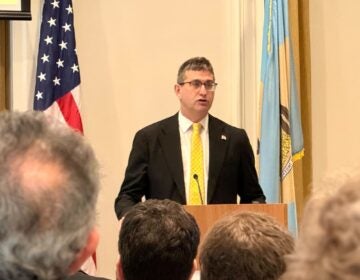More mental health support is coming to Delaware schools
A pair of laws signed Wednesday by Gov. John Carney provides more mental health and behavioral health professionals in K–12 schools.
Listen :52
Delaware Gov. John Carney speaks at an Amtrak facility in Bear, Del., Monday, Nov. 6, 2023. (AP Photo/Matt Rourke)
From Philly and the Pa. suburbs to South Jersey and Delaware, what would you like WHYY News to cover? Let us know!
This story was supported by a statehouse coverage grant from the Corporation for Public Broadcasting.
Delaware students needing more mental health support could soon see it in their schools under legislation signed into law by Gov. John Carney on Wednesday.
The two new laws are aimed at providing more mental and behavioral health professionals in K–12 schools. Children and youth are experiencing soaring rates of anxiety, depression, trauma, loneliness and suicide, according to Inseparable, a national mental health advocacy group.
House Speaker Valerie Longhurst (D-Bear) sponsored the bills. She said she’s concerned about the youth suicide rate — suicide is the second leading cause of death for youth aged 10–14 in the U.S. and the third leading cause for those aged 15–24, according to the Centers for Disease Control and Prevention.
“Kids have been struggling with suicide and anxiety, ADHD, and we really didn’t have the staffing in our schools,” Longhurst said. “Delaware ranked at the bottom in the country for the amount of counselors and behavioral health professionals in the schools.”
Suicide rates are up in Delaware no matter the age. According to the Delaware Division of Forensic Science’s 2023 annual report, 145 people died by suicide last year, the highest number since before 2019. The Division of Forensic Sciences only has its most recent annual report on its website. The majority of suicides occurred with a firearm.
The first piece of legislation adds a full-time social worker or counselor to high schools at a ratio of one per 250 students, to be phased in over three years. It also establishes a ratio of 700 high school students per psychologist.
It’s the third consecutive measure by Longhurst to add more mental health support to public schools. She sponsored a bill signed into law in 2021 that put the ratio of elementary school students and counselors at 250 to one, as well as legislation in 2022 that created the same ratio in middle schools.
The other bill signed by Carney on Wednesday requires the Department of Health and Social Services to change the state’s Medicaid plan so it covers services in school-based health centers for all Medicaid-eligible students. The deadline to submit the state’s amended plan to the federal government for approval is Jan. 1, 2025.
Angela Kimball, Inseparable’s chief advocacy officer, said the Medicaid legislation was particularly important because current Delaware law only allows insurance to be used and providers be reimbursed if the student or the family has a service plan under the Individuals With Disabilities Education Act.
“It allows the state to get federal matching funds for the services they provided, and those dollars come right back to Delaware and get reinvested in schools for mental health services,” she said. “So it’s a way, essentially, of stretching taxpayer dollars further, because taxpayers have already paid for those mental health professionals, and frankly, without the Medicaid billing, a state is leaving dollars on the table.”
“Supporting our students’ mental health is vital for our students’ readiness to learn,” state Education Secretary Mark Holodick said in a news release. “The challenges our students face in life don’t go away when they enter a classroom.”
Kimball said the pandemic exacerbated mental health issues among young people.
“It can be very easy to think that all of our youth are doing just fine, but honestly, all you have to do is start talking to students and you’ll hear that they’re struggling,” she said.
Longhurst said inspiration for the bills came from her work with the Police Athletic League. She said its after-school program serves about 500 youth, some dealing with emotional issues.
“It originated from seeing what was happening on the ground level and recognizing that it needs to change in the system,” she said. “Because a child goes to school to learn and be successful. If they’re dealing with trauma in their home life, it kind of derails their direction and their thought process in the schools and disrupts the classrooms.”
If you or someone you know is in crisis, call or text the National Suicide Prevention Lifeline at 988. The hotline is staffed 24/7 by trained counselors who can offer free, confidential support. Spanish speakers can call 1-888-628-9454. People who are deaf or hard of hearing can call 1-800-799-4889.

Get daily updates from WHYY News!
WHYY is your source for fact-based, in-depth journalism and information. As a nonprofit organization, we rely on financial support from readers like you. Please give today.







